Road signs in the Netherlands
The road signs of the Netherlands are regulated in the Reglement verkeersregels en verkeerstekens 1990, commonly abbreviated as RVV 1990.
Speed restrictions
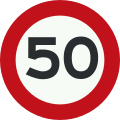 A1: Speed limit (50 kmh)
A1: Speed limit (50 kmh)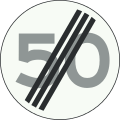 A2: End of speed limit (50 km/h)
A2: End of speed limit (50 km/h) A3: Speed limit displayed on an electronic display panel
A3: Speed limit displayed on an electronic display panel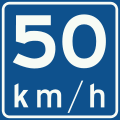 A4: Recommended speed
A4: Recommended speed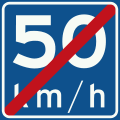 A5: End of recommended speed
A5: End of recommended speed
Priority
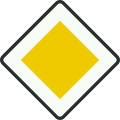 B1: Priority road
B1: Priority road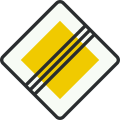 B2: End of priority road
B2: End of priority road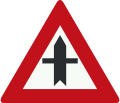 B3: Crossroads with priority
B3: Crossroads with priority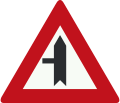 B4: Road junction with priority over minor road from the left
B4: Road junction with priority over minor road from the left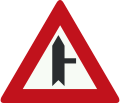 B5: Road junction with priority over minor road from the right
B5: Road junction with priority over minor road from the right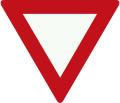 B6: Give priority to traffic on the main road ahead
B6: Give priority to traffic on the main road ahead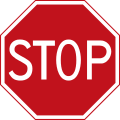 B7: Stop: Give priority to traffic on the main road ahead
B7: Stop: Give priority to traffic on the main road ahead
Road closed warnings
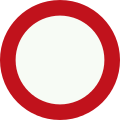 C1: Road closed in both directions to vehicles, riders and persons in charge of animals or livestock
C1: Road closed in both directions to vehicles, riders and persons in charge of animals or livestock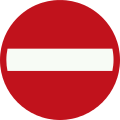 C2: No entry in this direction for vehicular traffic, horse riders and persons in charge of animals or livestock
C2: No entry in this direction for vehicular traffic, horse riders and persons in charge of animals or livestock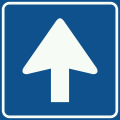 C3: One-way road
C3: One-way road.svg.png) C4: One-way road
C4: One-way road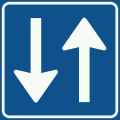 C5: Access permitted for both sides
C5: Access permitted for both sides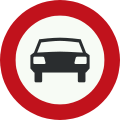 C6: No access for vehicles with more than two wheels
C6: No access for vehicles with more than two wheels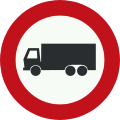 C7: No access for goods vehicles
C7: No access for goods vehicles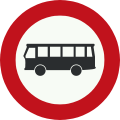 C7a: Closed to buses
C7a: Closed to buses C7b: Closed to buses and lorries
C7b: Closed to buses and lorries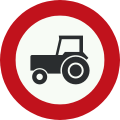 C8: No access for motor vehicles that cannot exceed 25 km/h
C8: No access for motor vehicles that cannot exceed 25 km/h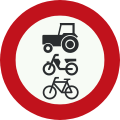 C9: No access for riders, cattle, wagons, motor vehicles not able to exceed a speed of 25 km/h, microcars, bicycles, mopeds or invalid carriages
C9: No access for riders, cattle, wagons, motor vehicles not able to exceed a speed of 25 km/h, microcars, bicycles, mopeds or invalid carriages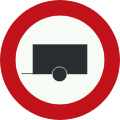 C10: No access for motor vehicle towing trailers
C10: No access for motor vehicle towing trailers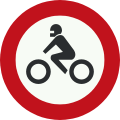 C11: No access for motor cycles
C11: No access for motor cycles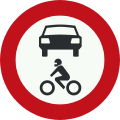 C12: No access for motor vehicles
C12: No access for motor vehicles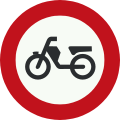 C13: No access for mopeds, motor-assisted bicycles or motor-powered invalid carriages
C13: No access for mopeds, motor-assisted bicycles or motor-powered invalid carriages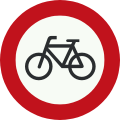 C14: No access for bicycles or for non-motor-powered invalid carriages
C14: No access for bicycles or for non-motor-powered invalid carriages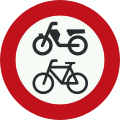 C15: No access for bicycles, mopeds and invalid carriages
C15: No access for bicycles, mopeds and invalid carriages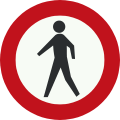 C16: No access for pedestrians
C16: No access for pedestrians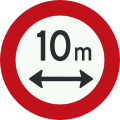 C17: No access for vehicles or combinations of vehicles with a length, including the load, greater than indicated
C17: No access for vehicles or combinations of vehicles with a length, including the load, greater than indicated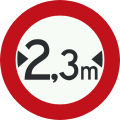 C18: No access for vehicles with a width, including the load, greater than indicated
C18: No access for vehicles with a width, including the load, greater than indicated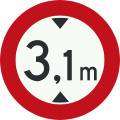 C19: No access for vehicles with a height, including the load, greater than indicated
C19: No access for vehicles with a height, including the load, greater than indicated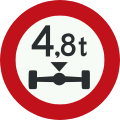 C20: No access for vehicles with an axle load greater than indicated
C20: No access for vehicles with an axle load greater than indicated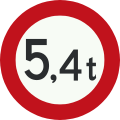 C21: No access for vehicles or combinations of vehicles with a total weight greater than indicated
C21: No access for vehicles or combinations of vehicles with a total weight greater than indicated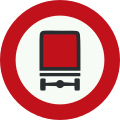 C22: No access for vehicles carrying hazardous substances
C22: No access for vehicles carrying hazardous substances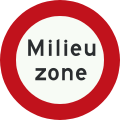 C22a: Environmental zone: no access for vehicles not compliant with article 86d of RVV 1990
C22a: Environmental zone: no access for vehicles not compliant with article 86d of RVV 1990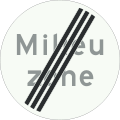 C22b: End of environmental zone
C22b: End of environmental zone C23-01: Rush-hour lane open
C23-01: Rush-hour lane open C23-02: Clear rush-hour lane
C23-02: Clear rush-hour lane C23-03: Rush-hour lane closed
C23-03: Rush-hour lane closed
Signs giving positive instructions
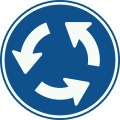 D1: Roundabout – give way to vehicles on the immediate left
D1: Roundabout – give way to vehicles on the immediate left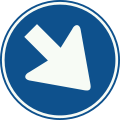 D2: Instruction to all drivers to keep to the right of the sign (or left if arrow is reversed)
D2: Instruction to all drivers to keep to the right of the sign (or left if arrow is reversed)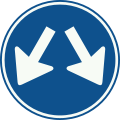 D3: The sign may be passed on either side
D3: The sign may be passed on either side D4: Instruction to drive ahead only
D4: Instruction to drive ahead only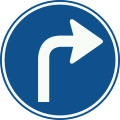 D5: Instruction to follow the direction ahead shown by the arrow
D5: Instruction to follow the direction ahead shown by the arrow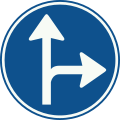 D6: Instruction to follow one of the directions ahead shown by the arrows
D6: Instruction to follow one of the directions ahead shown by the arrows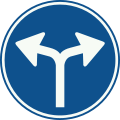 D7: Instruction to follow one of the directions ahead shown by the arrows
D7: Instruction to follow one of the directions ahead shown by the arrows
Parking and stopping
 E1: No parking
E1: No parking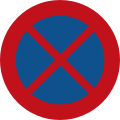 E2: No stopping
E2: No stopping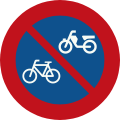 E3: No parking bicycles or mopeds
E3: No parking bicycles or mopeds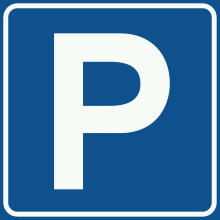 E4: Parking area
E4: Parking area E5: Taxi rank
E5: Taxi rank E6: Parking for disabled drivers
E6: Parking for disabled drivers E7: Parking permitted for the immediate loading and unloading of goods only
E7: Parking permitted for the immediate loading and unloading of goods only E8: Parking facilities only for the category or group of vehicle shown
E8: Parking facilities only for the category or group of vehicle shown E9: Parking for permit-holders only
E9: Parking for permit-holders only E10: Entrance to controlled parking zone
E10: Entrance to controlled parking zone E11: End of controlled parking zone
E11: End of controlled parking zone E12: Park and ride facilities
E12: Park and ride facilities E13: Parking facilities for car sharers
E13: Parking facilities for car sharers
Other signs giving orders
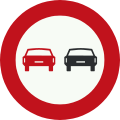 F1: No overtaking
F1: No overtaking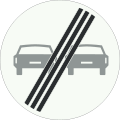 F2: End of no overtaking zone
F2: End of no overtaking zone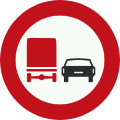 F3: No overtaking of cars by lorries
F3: No overtaking of cars by lorries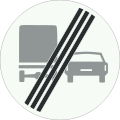 F4: End of zone with no overtaking of cars by lorries
F4: End of zone with no overtaking of cars by lorries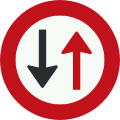 F5: Give way to oncoming vehicles
F5: Give way to oncoming vehicles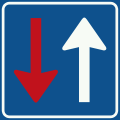 F6: Priority over oncoming vehicles
F6: Priority over oncoming vehicles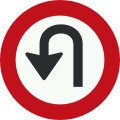 F7: No U-turns
F7: No U-turns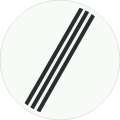 F8: End of all restrictions imposed by traffic signs
F8: End of all restrictions imposed by traffic signs F9: End of all restrictions imposed by electronic signalling panels
F9: End of all restrictions imposed by electronic signalling panels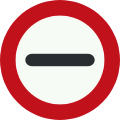 F10: Stop. The sign can also contain further information as to whom it is directed and why
F10: Stop. The sign can also contain further information as to whom it is directed and why
Traffic regulations
 G1: Motorway
G1: Motorway G2: End of motorway
G2: End of motorway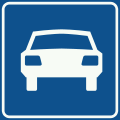 G3: Expressway
G3: Expressway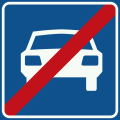 G4: End of Expressway
G4: End of Expressway G5: Living street
G5: Living street G6: End of Living street
G6: End of Living street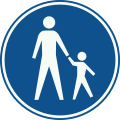 G7: Footpath
G7: Footpath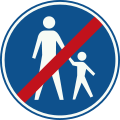 G8: End of footpath
G8: End of footpath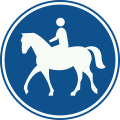 G9: Bridleway
G9: Bridleway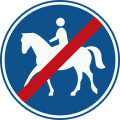 G10: End of bridleway
G10: End of bridleway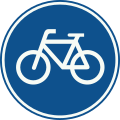 G11: Route for pedal cycles only
G11: Route for pedal cycles only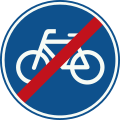 G12: End of pedal cycles route
G12: End of pedal cycles route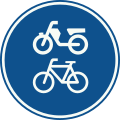 G12a: Route for pedal cycle and mopeds only
G12a: Route for pedal cycle and mopeds only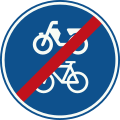 G12b: End of route for pedal cycles and mopeds
G12b: End of route for pedal cycles and mopeds G13: Optional cycle path
G13: Optional cycle path G14: End of optional cycle path
G14: End of optional cycle path
Built-up area
 H1: Built-up area
H1: Built-up area H2: End of built-up area
H2: End of built-up area
Warning
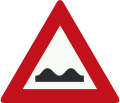 J1: Uneven road
J1: Uneven road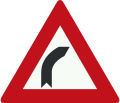 J2: Bend to right
J2: Bend to right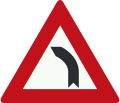 J3: Bend to left
J3: Bend to left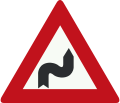 J4: Double bend, first to right
J4: Double bend, first to right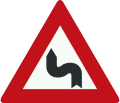 J5: Double bend, first to left
J5: Double bend, first to left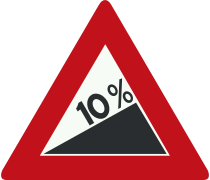 J6: Steep hill upward
J6: Steep hill upward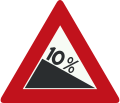 J7: Steep hill downward
J7: Steep hill downward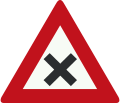 J8: Dangerous crossing
J8: Dangerous crossing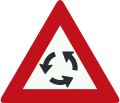 J9: Roundabout
J9: Roundabout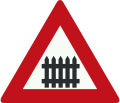 J10: Level crossing with barrier or gates ahead
J10: Level crossing with barrier or gates ahead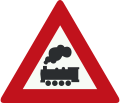 J11: Level crossing without barrier or gates ahead
J11: Level crossing without barrier or gates ahead J12: Level crossing with single track
J12: Level crossing with single track J13: Level crossing with two or more tracks
J13: Level crossing with two or more tracks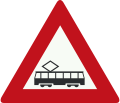 J14: Tram (crossing) ahead
J14: Tram (crossing) ahead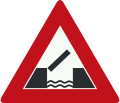 J15: Opening or swing bridge ahead
J15: Opening or swing bridge ahead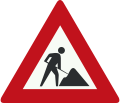 J16: Road works ahead
J16: Road works ahead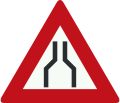 J17: Road narrows on both sides
J17: Road narrows on both sides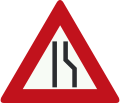 J18: Road narrows on the right side
J18: Road narrows on the right side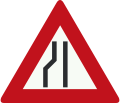 J19: Road narrows on the left side
J19: Road narrows on the left side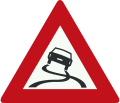 J20: Slippery road
J20: Slippery road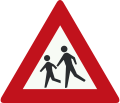 J21: School crossing
J21: School crossing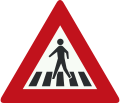 J22: Pedestrian crossing
J22: Pedestrian crossing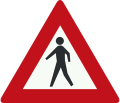 J23: Pedestrians
J23: Pedestrians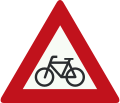 J24: Cyclists and moped riders
J24: Cyclists and moped riders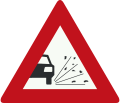 J25: Loose chippings
J25: Loose chippings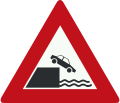 J26: Quayside or river bank
J26: Quayside or river bank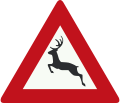 J27: Wild animals
J27: Wild animals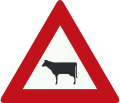 J28: Livestock
J28: Livestock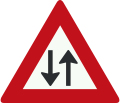 J29: Two-way traffic
J29: Two-way traffic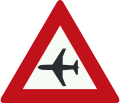 J30: Low-flying aircraft
J30: Low-flying aircraft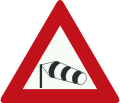 J31: Side winds
J31: Side winds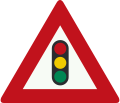 J32: Traffic lights
J32: Traffic lights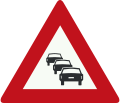 J33: Queues likely
J33: Queues likely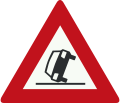 J34: Danger of accidents
J34: Danger of accidents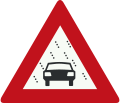 J35: Reduced visibility because of snow, rain or fog
J35: Reduced visibility because of snow, rain or fog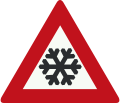 J36: Risk of ice or snow
J36: Risk of ice or snow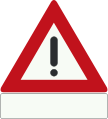 J37: Danger. Details of the danger are shown on the plate beneath
J37: Danger. Details of the danger are shown on the plate beneath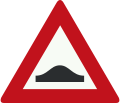 J38: Speed bump
J38: Speed bump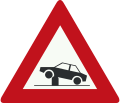 J39: Warning for retractable bollard (poller) in the traffic lane that can be used to regulate access to streets and areas.
J39: Warning for retractable bollard (poller) in the traffic lane that can be used to regulate access to streets and areas.
Direction
 K1: Low level motorway information sign showing both main and intermediary destinations and the motorway number (old)
K1: Low level motorway information sign showing both main and intermediary destinations and the motorway number (old)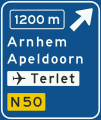 K2: Advance warning sign of a motorway showing the distance to the next exit and destinations after the exit (the top destination is the name of the exit), direction to aerodrome/airport and the road number (non-motorway)(old)
K2: Advance warning sign of a motorway showing the distance to the next exit and destinations after the exit (the top destination is the name of the exit), direction to aerodrome/airport and the road number (non-motorway)(old)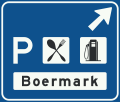 K3: Information sign for exit to motorway service area, showing the name of the rest area and symbols for the services offered (old)
K3: Information sign for exit to motorway service area, showing the name of the rest area and symbols for the services offered (old) K4: High level motorway information sign showing lane instructions for through traffic and exit panel showing intermediary destinations, with the motorway number and European route numbers (old)
K4: High level motorway information sign showing lane instructions for through traffic and exit panel showing intermediary destinations, with the motorway number and European route numbers (old)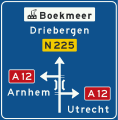 K5: Non-motorway advance information panel showing intermediary destinations, road numbers, a viaduct symbol and a sign for an industrial zone
K5: Non-motorway advance information panel showing intermediary destinations, road numbers, a viaduct symbol and a sign for an industrial zone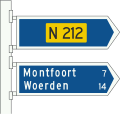 K6: Non-motorway information panels showing intermediary destinations and non-motorway road numbers
K6: Non-motorway information panels showing intermediary destinations and non-motorway road numbers K7: Signposts for cyclists and moped riders (finger posts) showing local and intermediary destinations, municipal cycle route numbers (above) and showing intermediary destinations and intermediary cycle route numbers (below)
K7: Signposts for cyclists and moped riders (finger posts) showing local and intermediary destinations, municipal cycle route numbers (above) and showing intermediary destinations and intermediary cycle route numbers (below) K8: Signposts (multiple) for cyclists and moped riders showing intermediary destinations and indicating an alternative route (in italics) to one of the destinations
K8: Signposts (multiple) for cyclists and moped riders showing intermediary destinations and indicating an alternative route (in italics) to one of the destinations K9: Diversion with alternative route shown on an advance warning panel for a non-motorway highway
K9: Diversion with alternative route shown on an advance warning panel for a non-motorway highway K10: Advance warning panel within a built-up area showing an intermediary destination, local destinations, local tourist sights, local facilities and road numbers through the town
K10: Advance warning panel within a built-up area showing an intermediary destination, local destinations, local tourist sights, local facilities and road numbers through the town K11: Lane instructions on a non-motorway highway. Panel showing intermediary destinations, road numbers and directions to a motorway
K11: Lane instructions on a non-motorway highway. Panel showing intermediary destinations, road numbers and directions to a motorway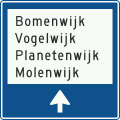 K12: Local signpost within a built-up area showing names of individual districts (in traffic areas)
K12: Local signpost within a built-up area showing names of individual districts (in traffic areas)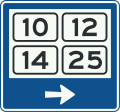 K13: Signpost within a built-up area showing district numbers (in traffic areas)
K13: Signpost within a built-up area showing district numbers (in traffic areas) K14: Route for the conveyance of hazardous materials
K14: Route for the conveyance of hazardous materials
Information
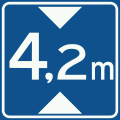 L1: No vehicles over height shown
L1: No vehicles over height shown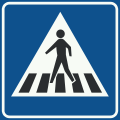
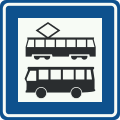 L3a: Tram stop/bus stop
L3a: Tram stop/bus stop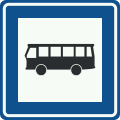 L3b: Bus stop
L3b: Bus stop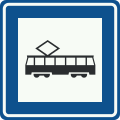 L3c: Tram stop
L3c: Tram stop L4: Get in lane
L4: Get in lane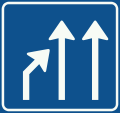 L5: End of lane
L5: End of lane L6: Lane fork
L6: Lane fork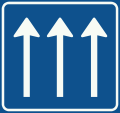 L7: Number of through lanes
L7: Number of through lanes L8: No through road for vehicles
L8: No through road for vehicles L9: Advance warning of a no through road for vehicles
L9: Advance warning of a no through road for vehicles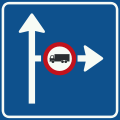 L10: Advance warning of traffic information for the direction shown
L10: Advance warning of traffic information for the direction shown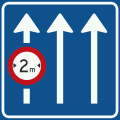 L11: Information on panel applies only to the lane(s) indicated
L11: Information on panel applies only to the lane(s) indicated L12: Information on panel applies only to the lane indicated
L12: Information on panel applies only to the lane indicated L13: Model sign traffic tunnel
L13: Model sign traffic tunnel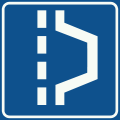 L14: Hard shoulder
L14: Hard shoulder L15: Hard shoulder equipped with emergency telephone and fire extinguisher
L15: Hard shoulder equipped with emergency telephone and fire extinguisher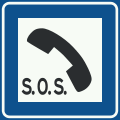 L16: Emergency telephone
L16: Emergency telephone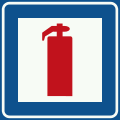 L17: Fire extinguisher
L17: Fire extinguisher L18: Emergency telephone and fire extinguisher
L18: Emergency telephone and fire extinguisher.svg.png) L19: Nearest exit or second nearest exits in the directions and at the distances indicated on the sign
L19: Nearest exit or second nearest exits in the directions and at the distances indicated on the sign
Retired versions
.svg.png) B1: Priority road
B1: Priority road.svg.png) B7: Stop: Give priority to traffic on the main road ahead
B7: Stop: Give priority to traffic on the main road ahead.svg.png) J37: Danger
J37: Danger
External links
- Road Traffic Signs and Regulations in the Netherlands
- Official text of the Reglement verkeersregels en verkeerstekens 1990 (Dutch)
- Comprehensive overview of Dutch road signs (Dutch)
This article is issued from Wikipedia - version of the 4/12/2016. The text is available under the Creative Commons Attribution/Share Alike but additional terms may apply for the media files.